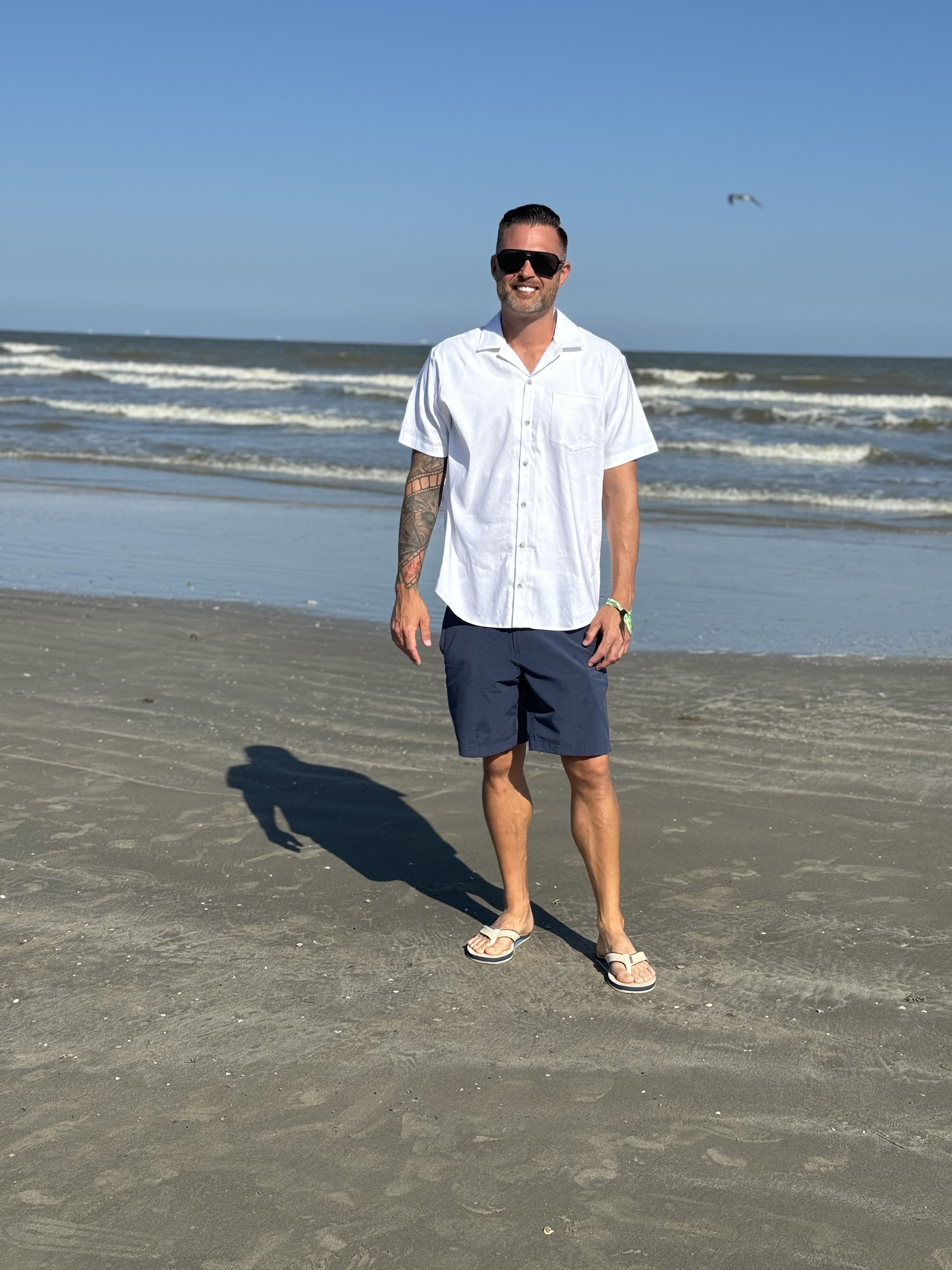
The gravel roads winding through Big Star RV Park in Big Springs, Texas, might seem unremarkable to anyone driving by. Rows of parked trailers and tiny homes line the grounds, their exteriors showing varying degrees of wear and tear. Yet for real estate developer and entrepreneur Micah Pilkey, this unassuming site is more than a collection of homes – it’s the foundation of a future community.
Pilkey believes in second chances with people and properties. He always sees the potential in what can be. It’s what drew him to Big Star RV Park in the first place.
“My key strength lies in my ability to identify and maximize the potential of underperforming properties,” Pilkey said. “I leverage this by conducting thorough market research and property assessments to uncover hidden opportunities in distressed RV parks. By transforming these underutilized spaces into thriving tiny home communities, I can create affordable housing solutions while generating substantial returns on investment.”
Big Star RV Park is a passion project for Pilkey. He has revitalized the community with beautiful landscaping, a nice gym, clubhouse, laundry machines, great patio area, a dog park, clean pools and two hot tubs. Residents rave about the amenities and the helpful staff.
“Great spot, very quiet,” one resident shared. “The staff is very friendly and attentive. [I] will definitely stay here again if I’m ever out this way.”
“I stayed in one of the brand new tiny homes and I was impressed with how clean the house was and the overall amenities,” wrote another resident. “The outside of the house was clean and the landscaping looked nice. The host was very nice and helpful. It was an overall great experience and I will recommend it to my family and friends.”
A Life Shaped by Early Lessons and Second Chances
Micah Pilkey’s journey to real estate success is anything but traditional. He learned about self-reliance and financial independence early in life, lessons that came with growing up in humble circumstances. “There’s something about not having much,” he says, “that teaches you how to spot value in unexpected places.”
His quest for stability and growth eventually guided him toward real estate, where he discovered a calling: turning overlooked or underutilized spaces into vibrant communities.
His life took a dramatic turn when he spent time in federal prison, an experience that proved to be a blessing in disguise and changed his life forever.
During his incarceration, he read voraciously about land use, real estate trends, and affordable housing initiatives. “Prison reshaped my outlook on life,” he has said on multiple occasions. Upon release, he channeled his energy into turning undervalued properties into viable housing communities, focusing on those most in need of a second chance—just as he once needed.
“A leader should possess vision, empathy, adaptability, and integrity,” Pilkey shares. “I embody these by setting a clear direction for my projects, understanding the unique needs of my team and community, and remaining flexible to changing circumstances. My integrity ensures that every decision is made with fairness and transparency.”
Micah Pilkey, a native of Utah, is on a mission to tackle the affordable housing crisis head-on by transforming overlooked spaces into stable communities. Big Star RV Park, with its potential for a tight-knit, sustainable enclave of tiny homes, perfectly aligns with that goal.
Enter Big Star RV Park
When Pilkey first visited Big Star, he saw opportunities.
For many developers, it looked like too big a gamble. But he saw something else.
The plan calls for upgrading existing infrastructure, adding efficient water and electrical systems, and introducing a range of public amenities, from community gardens to shared recreation areas. The goal is to create a sense of belonging for residents — a “homegrown solution,” as Pilkey calls it — that addresses the region’s growing need for affordable housing.
“Innovation plays a crucial role in my career and business strategy by enabling more efficient operations and improving the quality of the properties I develop,” he said. “New tools, such as advanced project management software, GIS mapping for property analysis and sustainable building techniques, allow me to better assess potential sites and streamline the development process. By staying ahead of industry trends, I can offer innovative solutions to challenges like housing shortages.”
According to Pilkey, successful real estate development extends beyond the physical construction of buildings. He places equal emphasis on community engagement, especially when tackling affordable housing projects. By holding town hall meetings and listening to residents’ concerns, he aims to build trust and ensure that redevelopment efforts are inclusive.
“I prioritize authenticity and mutual respect,” he said. “Regular communication, active listening and a genuine interest in others’ goals and challenges have been key to building strong relationships. I also believe in adding value to those relationships, whether by sharing insights, offering support or celebrating successes together.”
Forging Partnerships That Matter
Central to Pilkey’s business strategy are the nonprofits he partners with. These organizations facilitate job training, offer social services, and provide essential programs that help both current residents and newcomers thrive.
These organizations provide critical resources and services, including job training, legal aid and financial literacy. Pilkey says such collaborations free him to focus on scaling his projects, while also making sure residents receive the support they need to thrive.
“One strategy that has significantly propelled my business is building partnerships with nonprofits,” Pilkey said. “Collaborating with these organizations not only amplifies my mission to create affordable housing but also leverages their networks to identify communities in need. This synergy allows me to keep my projects aligned with my purpose while we address urgent social needs.”
Pilkey’s leadership style relies on data-driven insights paired with emotional intelligence, which he considers vital to effective decision-making. He frequently consults spreadsheets and local regulations, but he also checks in with current Big Star tenants who have deep ties to the area.
“Effective decision-making involves a balance of data-driven insights and emotional intelligence,” he said. “For me, that means thoroughly analyzing both the financial and social impact of every project. I always consult with my team and trusted mentors for diverse perspectives, and I stay attuned to the needs of the communities we serve.”
Micah Pilkey Focuses On Integrity With Business Decisions
Beyond resident interactions, Micah Pilkey, Utah, also keeps close watch on regulatory compliance and environmental standards. He believes this not only protects his professional reputation but ensures a stable foundation for his projects.
“To protect my professional reputation, I adhere to industry best practices, maintain high ethical standards and mitigate risks by carefully vetting contractors and partners,” he said. “I also make sure that all projects comply with zoning laws and environmental regulations to avoid legal challenges. Regularly assessing potential risks and having a crisis management plan in place helps safeguard my reputation in challenging situations.”
A Community Reborn
Even in its current transitional state, Big Star RV Park buzzes with renewed optimism. Future plans include communal gardens, shared recreation areas, and a multi-purpose building where residents can host events or attend workshops. For many tenants, it represents a chance to invest in a home that will remain affordable and sustainable for years to come. For Micah Pilkey, it symbolizes a larger mission—proving that overlooked properties can be turned into vibrant, stable communities.
He sees the property as a blueprint for change. While many communities grapple with a shortage of affordable housing, he believes converting distressed RV parks into tiny home neighborhoods could be a scalable model. He hopes to replicate the approach in other areas facing similar shortages.
“A leader should possess vision, empathy, adaptability and integrity,” Pilkey said. “I set a clear direction for my projects, remain flexible and keep my integrity at the center of everything I do. By staying true to these values, I can help create solutions that outlast any one individual and genuinely improve lives.”
Standing at the edge of the property, Pilkey often speaks with visible enthusiasm about Big Star’s future. He points to an area where communal gardens might flourish and outlines how shared spaces can bring people together. For him, it’s never just about buildings or profit margins; it’s about forging a community where hope and stability can take root.
“Affordable housing is about more than four walls and a roof,” he said. “It’s about dignity, it’s about support, and it’s about making sure people have a place to call home.”
Pilkey is certain change is on the horizon. With a plan fueled by empathy, innovation and collaboration, he is determined to help the park realize its full potential — one tiny home at a time.
By: Chris Bates





